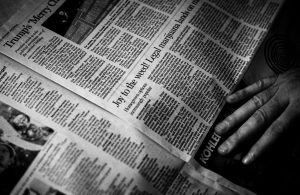“What are the most important actors in international relations?” My immediate response to Dr. Crawford’s question was states. Then I paused and thought about the answer in my mind, and realized that I came to this conclusion because of my past learning experiences in POLI 260, that strongly emphasized a realist worldview. My POLI 260’s reading on John Mearsheimer’s “The Tragedy of Great Power Politics” influenced my decision to take this course. Mearsheimer’s book zeroes in on the realist perspective that stresses the importance of power, derived from military and economic, in international politics. Even though his book provides an in-depth analysis of power and the importance of power in the international system, I am not entirely sold on his theory that power rules above other actors. Is it necessarily true that peace requires power? Quoting from Lord Acton’s letter to Bishop Mandell Creighton, he states that “power tends to corrupt, and absolute power corrupts absolutely.” Thucydides’ account of the Peloponnesian War highlights the truth in Lord Acton’s statement when we observe the fall of Athens. These two contradicting views on power sparked my interest to learn about what others think on this subject matter. What started out as a little curiosity of mine led to my interest in this course to learn about the different international theories and perspectives on the actors of the international playing field.

In the two classes that we have had, I like that this course does not have a straightforward trajectory. As we see from September 18th’s class, international relations is a contested subject, where there is no clear consensus on the so-called “core” of the field. As Dr. Crawford stated, “carving IR off as a separate discipline is becoming more and more complex” due to the fact that many fields interconnect with IR because the world we live in, our reality, is complex and difficult to understand. The intersectionality of all social sciences challenges the boundaries of “natural” science that has been in place for many years and it reflects the behaviour and attitude we should have whilst learning about international relations theories. The epistemological disputes of this field intrigue me and it forces me to be critical of the subjects, themes, and ideas I learn. We are confronted by the ugly truth about international relations and theories when Dr. Crawford quotes Robert Cox’s statement that “theory is always for someone, and for some purpose.” It sheds light on the importance of being critical of the information we are given and to dig deeper to find the hidden agenda. Being able to take off our biased lenses and put on our critical lenses constitutes a huge portion of education, which social sciences strongly encourage and teach. The fact that IR or political science, in general, does not conform to the “natural” sciences allows me to engage critically with the readings and discussions to develop myself into a critical thinker. I hope that throughout the duration of this course, I will be able to challenge the biases and preconceptions that I have and learn to view topics through different lenses. After all, the goal of education is to become critical thinkers.

Hi, this is a comment.
To get started with moderating, editing, and deleting comments, please visit the Comments screen in the dashboard.
Commenter avatars come from Gravatar.